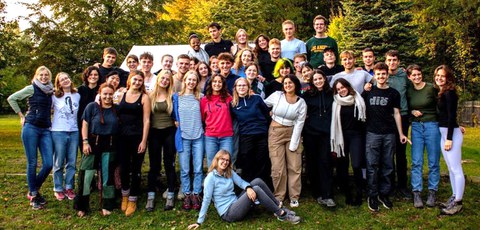Aug 14, 2024
Beacon of internationalization made in Dresden
Dagmar Möbius
The Center for International Studies was founded in 2002. Today, as back then, it has a team of five professors. It has the status of a Central Academic Unit and contributes to TU Dresden's international visibility.
"We are not a faculty, but we have the same rights as a faculty and our own budget. Our small team has both the task and expertise to advance the degree programs," says the Managing Director of the Center for International Studies Stefan Robel. This requires strategic action-taking capacity. In simple terms: University lecturers from different disciplines and faculties must be able to act together on an equal footing, in a positive and targeted manner. To this end, the Center has an Academic Board, which is comparable to a Faculty Board and is responsible for all matters relating to quality assurance and the continued advancement of the International Relations degree programs. "This equal status of the subjects is essential," emphasizes the political scientist. "Otherwise, we would have to abandon our successful concept."

Students of International Relations from the 2022 and 2023 cohorts on the ‘ERNA’, a trip to Saxon Switzerland organised by the IB Association (to get to know each other)
The element of continuity
In an institution which is capable of taking action, people always play a key role. "You need a team like my small team to be successful," laughs Stefan Robel, who is also a lecturer, organizes selection procedures, manages "our own Examination Office", and appreciates "a certain element of continuity." The center has few teaching staff of its own, cooperates with the faculties and covers a significant part of its teaching through teaching assignments. "We make a virtue out of necessity and bring in interesting people from many different places. It works, even though we can't pay as much as other institutions. What our freelance lecturers from all over the world receive for their commitment is comparatively modest. But they are always happy to teach at the Center for International Studies because they want our great students," Robel says happily.
More than 30 university partners
The Center for International Studies cooperates with more than 30 universities around the world. The fact that more German students go abroad than vice versa is due to the obligatory semester abroad. "That's also because those who study here want to work on an international level." Moreover, the undergraduate Bachelor's degree program is taught in German with two foreign languages. There also are regular summer schools. In addition, high-ranking guests from politics and academia come to speak to the students about their work. Not all of these guests are publicly announced, as was the case with the recent visit by a former defense minister.
Own alumni program
Since its introduction in the 1998/1999 winter semester, more than 600 Bachelor's and more than 150 Master's students have graduated from TUD's International Relations program. All of them are ambassadors for their alma mater. The Center for International Studies has a mentoring program. Since April 2000, the non-profit International Relations Association Dresden has been committed to improving the working conditions and career opportunities of alumni and encouraging the professional networking between students and alumni of the International Relations degree program. The association regularly organizes events, such as this year's Bachelor Freshman Week, to be held between October 7-13, 2024.

Annual General Meeting of the student association International Relations Dresden e.V. in December 2022.
Beacon of internationalization
"We generate international visibility and make our own tiny contribution to TU Dresden's good reputation. Not the Center alone, but also our students," says Stefan Robel. "When I see where our alumni and especially many of our women graduates are working today, I am very proud. There are so many women in leadership positions! This is an ongoing phenomenon rather than a new development. We don't even need to provide any special support for women in the IB degree program. Our students are so good, the young women promote themselves or each other, so to speak, together with their male fellow students. That works very well.” Since 2021, the Center for International Studies can call itself a beacon of internationalization. It was one of 22 institutions at TU Dresden to be awarded this title.
Contact:
TU Dresden
Center for International Studies
Managing Director (and Alumni Officer) Stefan Robel
